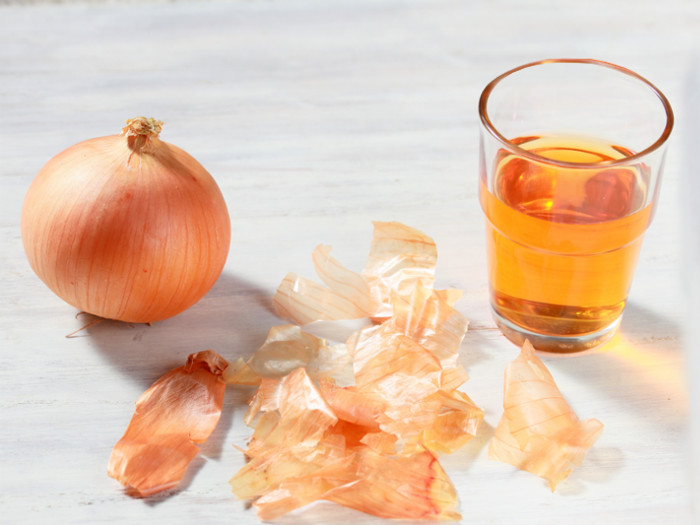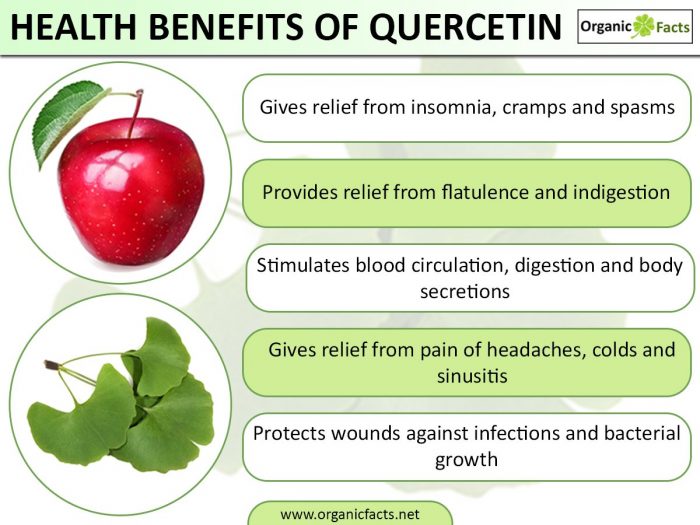Quercetin is a powerful flavonoid with a wide range of health benefits, including its ability to reduce inflammation, eliminate pain, protect against cardiovascular diseases, lower blood pressure, manage diabetes, boost the immune system, and reduce irritation of the skin.
What is Quercetin?
It is a flavonoid, which means that it is a plant pigment that is similar in molecular structure to a flavone. It is also considered a very powerful antioxidant and is typically the main component in the red and orange pigmentation in various fruits and vegetables. You can also find it as a coloring agent in wine and various teas. [1]
Quercetin is found in many different food sources in significant portions, most notably in capers, lovage, sorrel, dill, plums, dates, kale, cranberries, apples, sweet potatoes, blueberries, broccoli and many other commonly eaten foods. Since molecular research on organic components of food is relatively new, the research on it continues, but there have already been many promising studies published that show this antioxidant flavonoid to be a big boost to your overall health. [2]
Health Benefits of Quercetin
Let’s explore a bit more to see exactly how quercetin benefits our health!
Anti-inflammatory Properties
Quercetin displays a number of anti-inflammatory properties, in a similar way that aspirin does to reduce inflammation and associated pain says a report published in the Mediators of Inflammation journal. It inhibits certain chemical pathways from generating the inflammation. This makes it capable of reducing the pain of arthritis, gout, rheumatism, and the general inflammation that people suffer from colds, fevers, muscle aches, and strain [3]

Quercetin is a flavonoid present in many fruits and vegetables. Photo Credit: Shutterstock
Healthy Cardiovascular System
A study published by Dr. Francisco Perez-Vizcaino in the journal Free Radical Research shows the association between a lower mortality rate and incidence of heart attack for test subjects who regularly ingested the antioxidant flavonoid. Most of this protective property seems to come from its ability to reduce the amount of plaque in the blood vessels and arteries by eliminating LDL cholesterol, also known as “bad cholesterol”. Studies have connected reduced amounts of LDL cholesterol with a decrease in atherosclerosis, heart attacks, and strokes. [4]
Help Manage Diabetes
According to a report published by Dr. P Jayamurthy and his team from the National Institute for Interdisciplinary Science and Technology, Council of Scientific and Industrial Research, India, quercetin has certain qualities which could help manage type 2 diabetes. It is primarily observed to do this by activating multiple therapeutic targets of type 2 diabetes. [5]
Helps Alleviate Asthma
Quercetin functions as a bronchodilator and reduces the amount of inflammatory or allergic reaction chemicals in the body. Therefore, it can reduce the severity of asthma attacks that react to those chemicals, and also reduce various forms of congestion that are unrelated to asthma, states a 2013 report published in the Nutrients Journal. [6]
Anticancer Potential
Quercetin, like several other flavonoids, is seen to exhibit ‘chemopreventive’ properties and have a positive impact on the growth of cancer cells. Additionally, they can act as antioxidants, which should help prevent oxidative damage. They have also shown potential as an anti-carcinogen, according to a paper published in the journal [7] [8]Evidence-based Complementary and Alternative Medicine.
A 2017 study published in the journal [9]Oncology Reports suggests that this compound may work in tumor suppression in certain types of cancers such as ovarian, colorectal, breast, lung, etc.
However, more studies are required to confirm the anticancer effects of quercetin.
Helps Lower Blood Pressure
Usually associated with cardiovascular health, hypertension affects millions of people around the world every year. Dr. Edward RL, Division of Nutrition, University of Utah, in his report published in the Journal of Nutrition states that quercetin has shown the ability to lower blood pressure and eliminate the complications so often associated with that disease. As a vasodilating, anti-inflammatory, and antioxidant substance, it helps your heart health and offers protection against a variety of conditions. [10]

Quercetin has antioxidant properties. Photo Credit: Shutterstock
Anti-allergenic Quality
Researchers at the Department of Pharmacology, University of Brazil, conducted a study involving mice, which compared the anti-inflammatory effect of quercetin-loaded microemulsion (QU-ME) and quercetin suspension (QU-SP) in an experimental model of airways allergic inflammation. It is frequently used in allergy treatments since antioxidants with structures like quercetin reduce the number of histamines that are released when an allergenic pathway is stimulated. Reducing histamines means a reduced number of symptoms, and quercetin has specifically been linked to reduced signs of eczema, hives, and hay fever. [11]
A Few Words of Caution: There are no inherent dangers of quercetin, although some reports have suggested that excessive consumption of foods with this flavonoid has resulted in headaches, and tingling in the arms and legs. Extreme amounts can even result in kidney damage. Be responsible, consume a healthy amount, and enjoy a healthy life!
